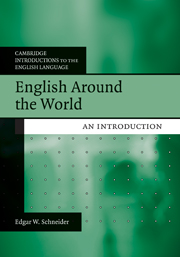Book contents
- Frontmatter
- Contents
- List of figures
- List of maps
- List of tables
- List of texts and audio samples
- Acknowledgments
- A note on using this book
- 1 Introduction
- 2 Basic notions
- 3 Historical background
- 4 Language crossing an ocean: Old World and New World
- 5 Settlers and locals: Southern Hemisphere Englishes, transported and newly born
- 6 Missionaries, merchants, and more: English is useful, English is ours
- 7 Language development: a general perspective
- 8 Issues and attitudes
- 9 Conclusion
- Appendix 1 Phonetic characters
- Appendix 2 A list of guiding questions on English in any specific region
- Glossary
- References
- Index
6 - Missionaries, merchants, and more: English is useful, English is ours
- Frontmatter
- Contents
- List of figures
- List of maps
- List of tables
- List of texts and audio samples
- Acknowledgments
- A note on using this book
- 1 Introduction
- 2 Basic notions
- 3 Historical background
- 4 Language crossing an ocean: Old World and New World
- 5 Settlers and locals: Southern Hemisphere Englishes, transported and newly born
- 6 Missionaries, merchants, and more: English is useful, English is ours
- 7 Language development: a general perspective
- 8 Issues and attitudes
- 9 Conclusion
- Appendix 1 Phonetic characters
- Appendix 2 A list of guiding questions on English in any specific region
- Glossary
- References
- Index
Summary
In this chapter …
In this chapter we will have a closer look at the historical background and the current usage conditions of English mainly in countries which Kachru termed the “Outer Circle,” i.e. typically postcolonial countries where English holds a strong position as a widely used second language (and it is sometimes becoming a first language, as we will see). To these world regions English was brought as the language of traders and missionaries, and later, when the British held a tighter colonial grip, administrators and soldiers. Basically, however, their stay in colonies was planned as being target-directed and transient – except for small expatriate communities we typically do not find large resident settler groups of British ancestry in the localities discussed here. The diffusion of English to these countries has been a long-standing process which, interestingly enough, has gained special momentum only fairly recently, after the end of the colonial period. In regions like West Africa and India the advent of English dates back to the seventeenth century, but it was only in the nineteenth and twentieth centuries, with English becoming the language of political dominance, education, and social advancement in general, that it gained special prominence. Since then, however, and particularly after independence and for the last few decades, in many places it has mushroomed, and frequently it has been transformed substantially in this process. […]
- Type
- Chapter
- Information
- English Around the WorldAn Introduction, pp. 134 - 188Publisher: Cambridge University PressPrint publication year: 2010

